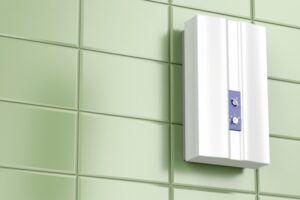Water heaters are one of those home comfort systems that are relatively easy to take for granted, even though they are one of the appliances we rely on the most. Could you even imagine being without hot water for showering and all the other needs a modern household has?
When it comes time to replace your water heater–yes that’s right, no water heater lasts forever–then you’ll want to do your due diligence in exploring your options to make sure you have the most efficient system possible.
The two main options to choose from when selecting a water heater are the tank water heater and the tankless water heater. You may have heard a lot about the tankless system in recent years, as it is growing in popularity. It’s become an ultra-efficient option for many homeowners! However, that doesn’t necessarily mean it’s right for every home and situation. Read on as we uncover the differences between these systems, and give us a call if you want help making an educated decision between the two.
The Tank Water Heater
Tank water heaters are still very popular in homes today, and for good reason. They do the job required of them, and as long as you’re matched with the right one for your needs, it doesn’t cost a lot to use. The distinguishing feature of a tank water heater is the storage tank, which is actually available in different sizes–by the gallon.
Why do they come in different sizes? Once a tank water heater’s hot water supply runs out, there will be a delay in the hot water supply as it heats up a new batch. By having a larger reserve of water to draw from, you can use the hot water for longer (or for more appliances) without needing to refill it so frequently.
There is a drawback here, and it’s one that causes many to consider the tankless option–hot water that goes unused will encounter what’s called standby heat loss. If you have a tank water heater that’s actually too big for your needs, you’ll essentially be paying for the energy needed to heat up water that you aren’t able to use–so you’re paying more for less enjoyment.
The Tankless Water Heater
The tankless water heater, as we alluded to above, is becoming a popular alternative to the storage tank water heater. They function in a fundamentally different way than their tank water heater counterparts. First off, they don’t use a storage tank! Instead, a tankless water heater creates hot water through electrical resistance, with the hot water only being produced when you need it–when there is a demand for it from a hot water tap or appliance in your home.
This is why tankless water heaters are seen as more efficient–they don’t create standby heat loss. The drawback of a tankless system, however, is that it can be overwhelmed if too many fixtures and appliances are demanding hot water from it at once. This is why it’s so important to talk to a trained and experienced professional to make sure you’re getting the most bang for your buck!
DeHart Plumbing, Heating, and Air Inc. is your trusted resource for Modesto, CA water heater services. Contact us when you’re ready for your water heater installation!











